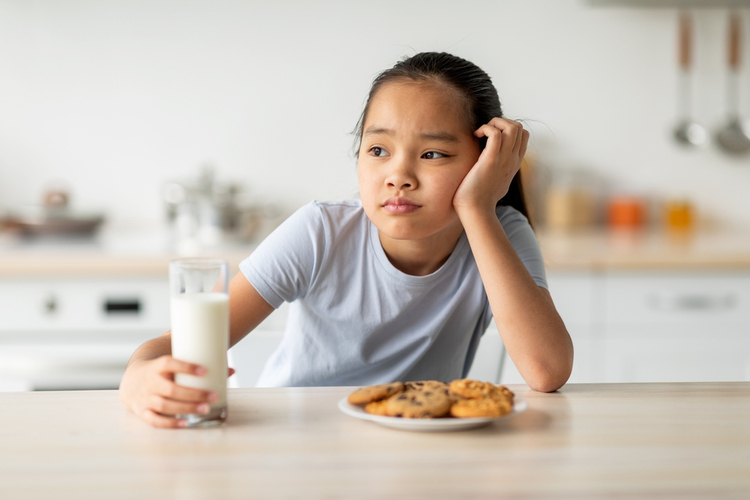Food Allergy Symptoms in Kids: What They Are and How to Recognize Them as a Parent
According to Food Allergy Research and Education, one in thirteen children in the United States is allergic to at least one food. Of those, around 40% have experienced life-threatening reactions. The catch-22 situation for parents is that they usually aren’t aware of a food allergy until after their child has eaten it and suffered a bad reaction. That is why it is essential for parents to be aware of the symptoms of the most common food allergies in order to cut that food from the child’s diet as soon as possible.
- What Is a Food Allergy?
- The Most Common Allergies in Children
- Food Allergy vs. Food Intolerance
- Food Allergy Testing
- Treatment for Food Allergy
- Summary
What Is a Food Allergy?
Food allergies are caused by an immune system response to a specific food. The immune system, which is the body’s defense mechanism, mistakes some proteins in the offending food as a threat. As a result, chemicals are released to fight the proteins. This causes a range of negative effects that usually affect a person’s breathing, digestive system, cardiovascular functioning, and skin.
There are about 15 million people in America with food allergies. Children are more likely to have a food allergy than adults; however, children may also grow out of the allergy as they get older. For example, approximately 80% of children with egg, wheat, and milk allergies will grow out of them by the age of 16. For peanut allergies, that figure is about 25%.
The most common allergy symptoms are:
- Runny nose
- Sneezing
- Watery eyes
- Coughing
- Diarrhea
- Nausea
- Headache
- Dizziness
- Hives
- Eczema
- Swollen lips, tongue, and cheeks
- Stomach pain
A severe allergic reaction is termed anaphylaxis. It involves severe breathing difficulty, dizziness, fainting, and swelling.
The Most Common Allergies in Children
The following are the eight most common food allergies in children:
- Eggs
- Cow’s milk
- Fish
- Peanuts
- Shellfish
- Tree nuts
- Wheat
- Soy
Milk Allergies
Milk allergies are the most studied food allergy. A milk allergy is a reaction to the proteins in milk—whey or casein. It is different from lactose intolerance, which is a reaction to the fats in the milk. A child who has a milk allergy is also likely to be allergic to other foods, such as soy, peanuts, and eggs.

Children with milk allergies are also more likely to suffer from conditions such as eczema, asthma, and hay fever.
Discover the truth: Is milk good or bad for kids?
Food Allergy vs. Food Intolerance
Food allergy and food intolerance are two different things. However, they can share the same symptoms, which makes it difficult for parents to differentiate between them. Food intolerance, which is much more common than an allergy, may be caused by several factors, including:
- Lack of an enzyme needed to digest the food
- Irritable bowel syndrome
- Sensitivity to an additive in the food
- Psychological factors
- Celiac disease
In some instances, a person may be able to tolerate small portions of a food that they are intolerant to.
In contrast, a food allergy is caused by the immune system incorrectly treating certain proteins in the food as a toxin. Any amount of the food will trigger symptoms.
Egg Allergies
Egg allergies often occur in very young children. While many of them will grow out of the allergy by or around the age of 8, others will maintain their egg allergy for life. The allergy will relate to a protein in either the yolk or the white of the egg. As a result, the allergy will only relate to that part of the egg. So, a person who is allergic to a yolk protein will be able to eat egg whites with no problem.
Peanut Allergies
Peanut allergies are among the most common allergies in young children. Youngsters who have a peanut allergy are probably going to have it for life. A peanut allergy is also more likely to cause an anaphylactic reaction. This may include the inability to breathe or even cardiac arrest.

Treatment for anaphylaxis involves immediate administration of epinephrine in the form of an EpiPen. After administering the EpiPen to a child, parents should monitor their condition for several hours to ensure that they do not have a relapse and, in serious cases, seek medical help.
Food Allergy Testing
Parents don’t have to wait until their child has a negative reaction to a food to discover an allergy. Food allergy testing allows them to be proactive about diagnosing any allergies and cutting out foods from the child’s diet.

There are three main food allergy tests for children:
- Skin prick test: A drop of the allergen is placed on a fingertip, then the first layer of skin is pricked. If the child is allergic to the food, itchiness and redness will develop within 10–15 minutes.
- Specific IgE blood test: This test measures the levels of a specific IgE antibody directed to the allergen in the blood. It is not considered to be a very reliable form of allergy testing.
- Physician-supervised oral food challenge: Here the child consumes gradually increasing amounts of a suspected food in the presence of an allergist. This is considered to be the most reliable form of food allergy testing in children but is also time-consuming, taking 4–8 hours to complete. As an alternative, you may wish to order an at-home food sensitivity test.
Treatment for Food Allergy
There is no medical treatment that will eliminate the symptoms of food allergies so that a child can eat that food. The best treatment is to ensure that the child stays away from the offending food. It is recommended that parents have their child’s food allergy tested and then remove the identified foods, as well as other foods within that food grouping.
Mothers who are breastfeeding a child with an identified allergy should not consume the offending food themselves. Parents should also be aware of any vitamin and mineral deficiencies that may result from cutting certain foods from their child’s diet. This should be compensated by foods that the child can tolerate.
Summary
Avoiding foods that cause allergic reactions in their kids is a real challenge for parents. It requires constant vigilance along with proactive measures such as having the child tested for allergies and removing the identified foods from the child’s diet. Doing so will give your child their best protection from the nasty, and potentially deadly, effects of a food allergy.








